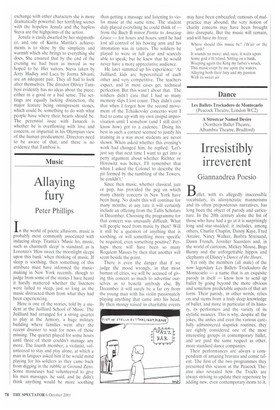Music
Allaying fury
Peter Phillips
In the world of poetic allusions, music is probably most commonly associated with inducing sleep. Titania's 'Music ho, music, such as charmeth sleep' is standard, as is Lorenzo's 'How sweet the moonlight sleeps upon this bank' when thinking of music. If sleep is soothing, then something of this attribute must have informed the musicmaking in New York recently, though to judge from some of the stories I have heard it hardly mattered whether the listeners were lulled to sleep, just so long as the music distracted them from what they had been experiencing.
Here is one of the stories, told by a student at the Juilliard School of Music. The Juilliard had arranged for a string quartet to play at the Armory, a huge military building where families went after the recent disaster to wait for news of those missing, The quartet played for some hours until three of them couldn't manage any more. The fourth member, a violinist, volunteered to stay and play alone, at which a man in fatigues asked him if he would mind playing for his soldiers as they came back from digging in the rubble at Ground Zero. Some masseuses had volunteered to give his men massages, he said, and he didn't think anything would be more soothing than getting a massage and listening to violin music at the same time. The student duly played everything he could think of — from the Bach B minor Partita to Amazing Grace — for hours and hours, until he had lost all control of his bowing arm and his intonation was in tatters. The soldiers he played to were in full gear and scarcely able to speak; but he knew that he would never have a more appreciative audience.
He later summed up his experience: 'At Juilliard, kids are hypercritical of each other and very competitive. The teachers expect, and in most cases get, technical perfection. But this wasn't about that. The soldiers didn't care that I had so many memory slips I lost count. They didn't care that when I forgot how the second movement of the Tchaikovsky concerto went I had to come up with my own insipid improvisation until I somehow (and I still don't know how) got to a cadence.' Doing his best in such a context seemed to justify his training in a way most students are never shown. When asked whether this evening's work had changed him, he replied: 'Let's just say that next time I want to get into a petty argument about whether Richter or Horowitz was better, I'll remember that when I asked the Colonel to describe the pit formed by the tumbling of the Towers, he couldn't.'
Since then music, whether classical, jazz or pop, has provided the peg on which many charity concerts in New York have been hung. No doubt this will continue for many months; at any rate it will certainly include an offering from the Tallis Scholars in December. Choosing the programme for that concert was unusually difficult. What will people need from music by then? Will it still be a question of anything that is soothing, or will something more specific be required, even something positive? Perhaps there will have been so many Requiem Masses by then that another will seem beside the point.
There is even the danger that if we judge the mood wrongly, in that most human of cities, we will be accused of giving this concert as much to advertise ourselves as to benefit anybody else. By December it will surely be a far cry from the young man with his violin passionately playing anything that came into his head. By then money raised in charitable events may have been embezzled; rumours of malpractice may abound; the very notion of charity concerts may have been brought into disrepute. But the music will remain, and will have its force:
Where should this music he? i'th'air or the 'arth?
It sounds no more: and, sure, it waits upon Some god o'th'island. Sitting on a bank, Weeping again the King my father's wrack, This music crept by me upon the waters, Allaying both their fury and my passion With its sweet air.


































































































 Previous page
Previous page